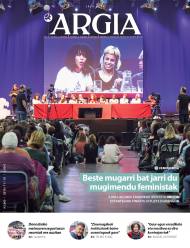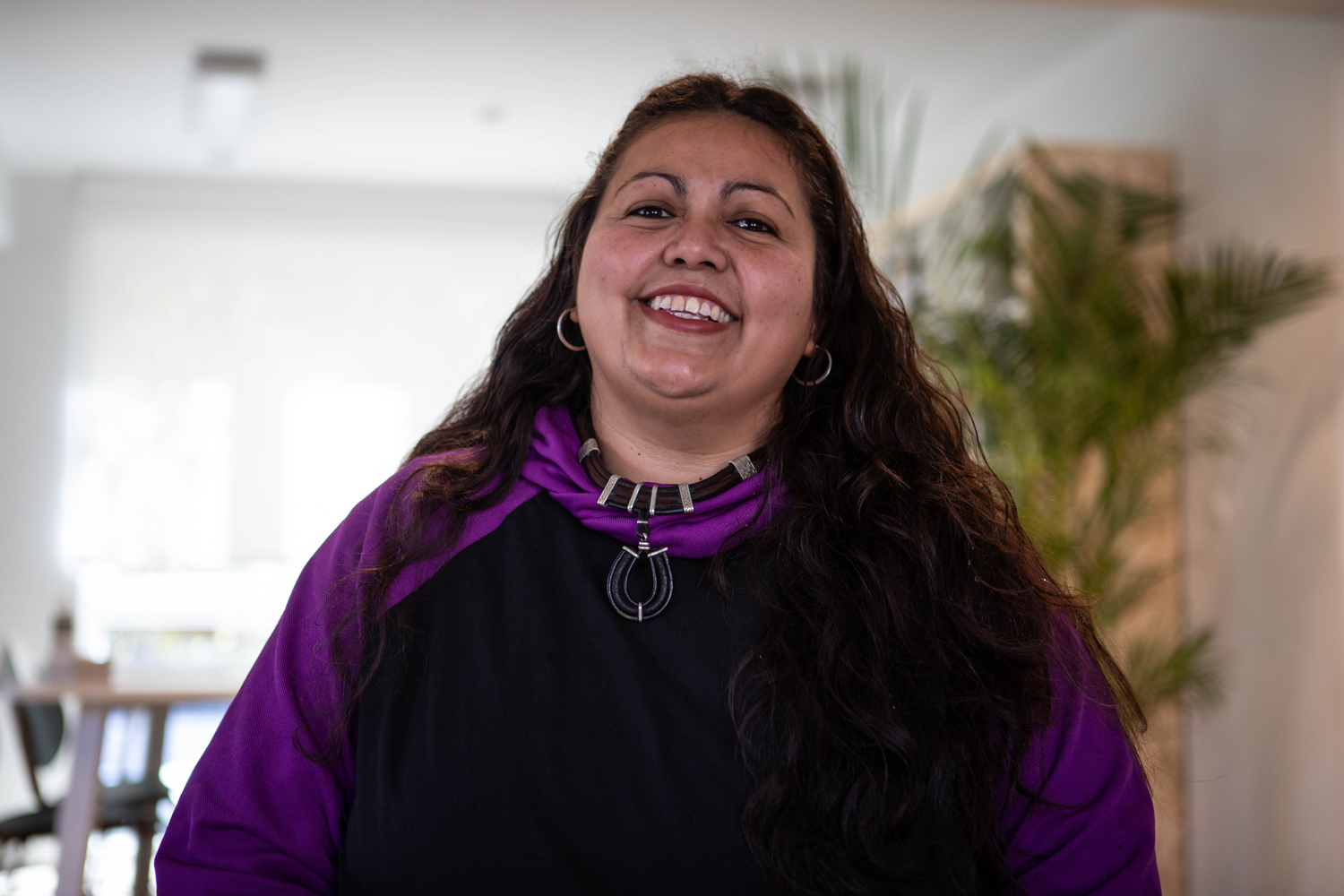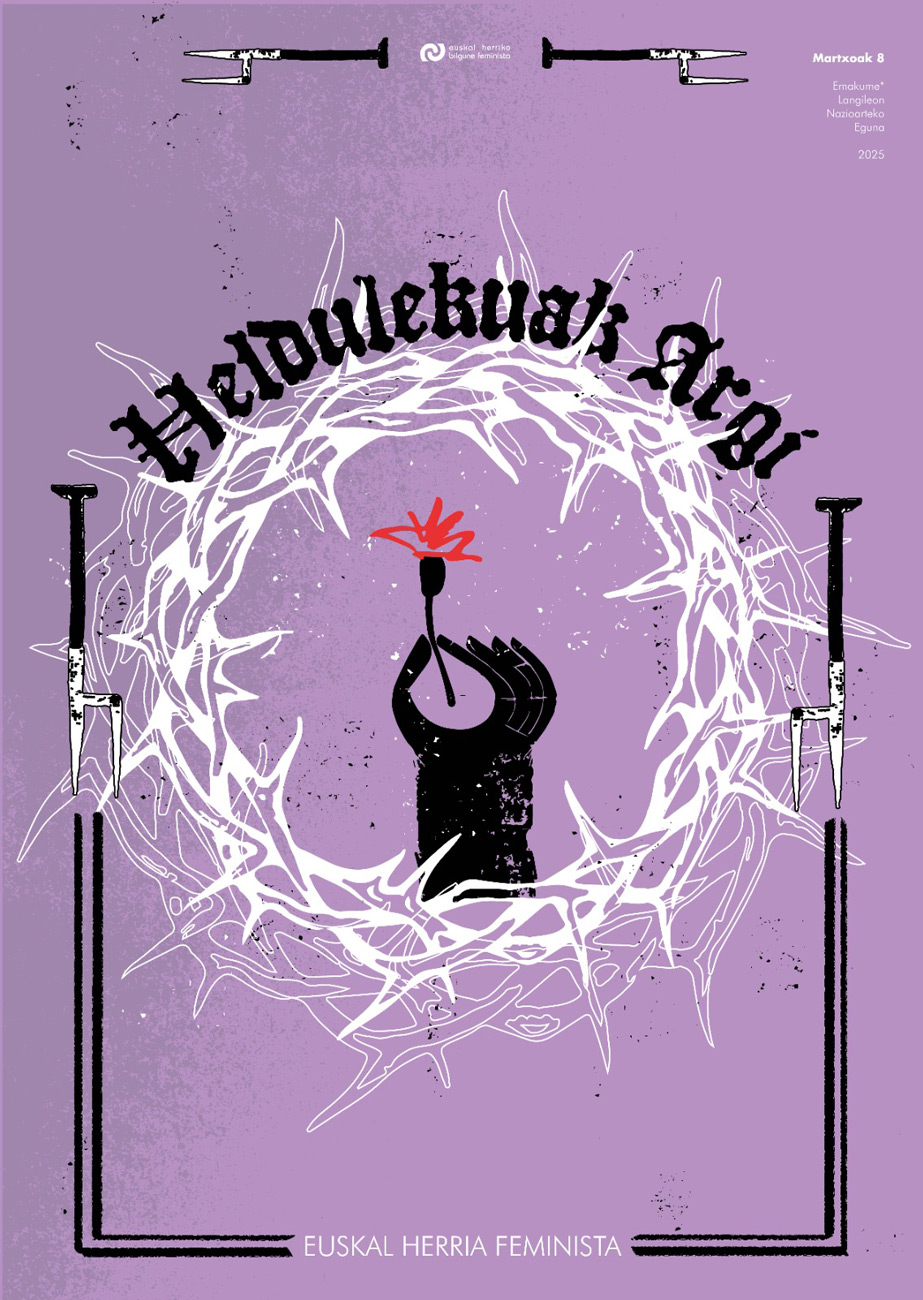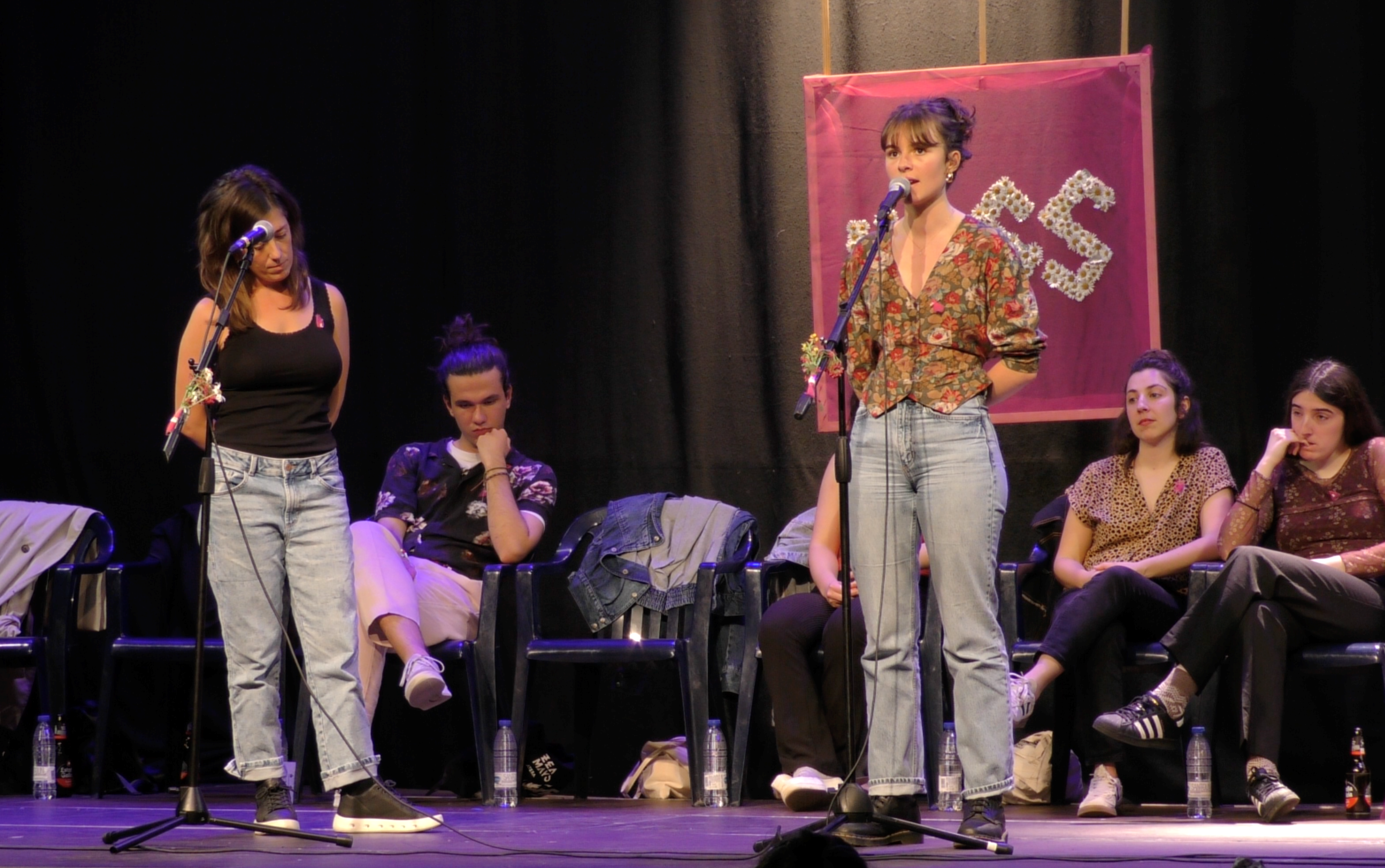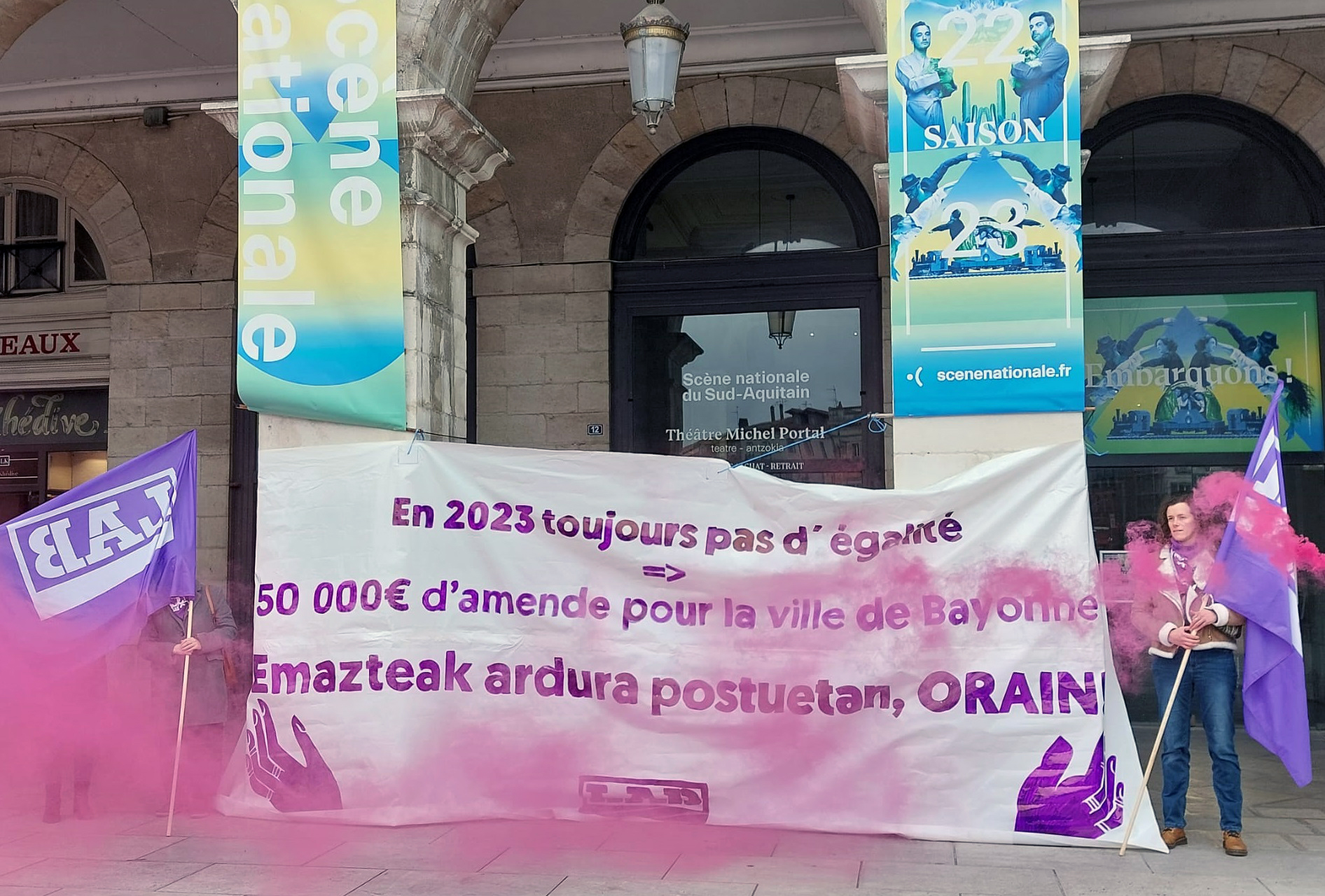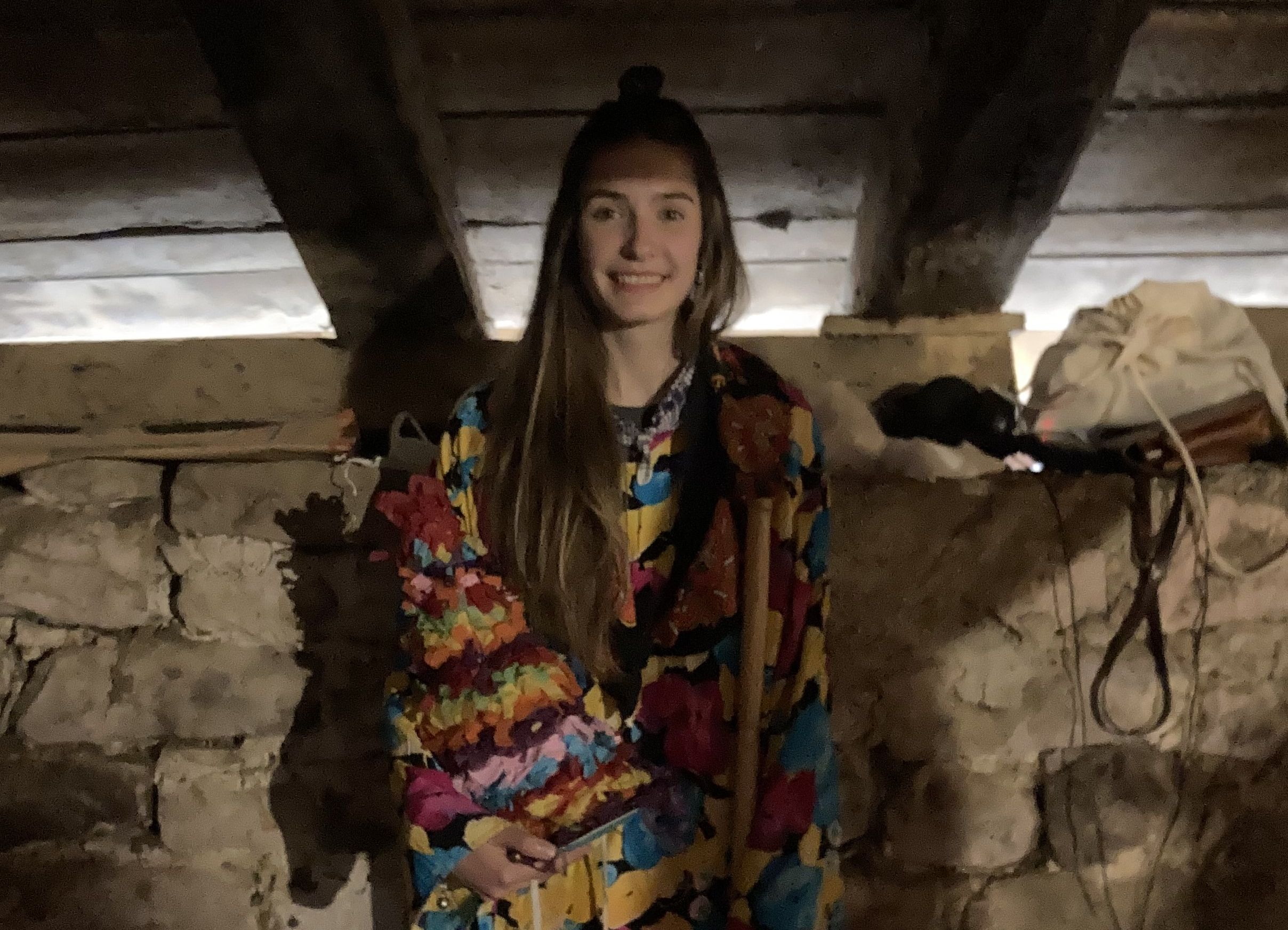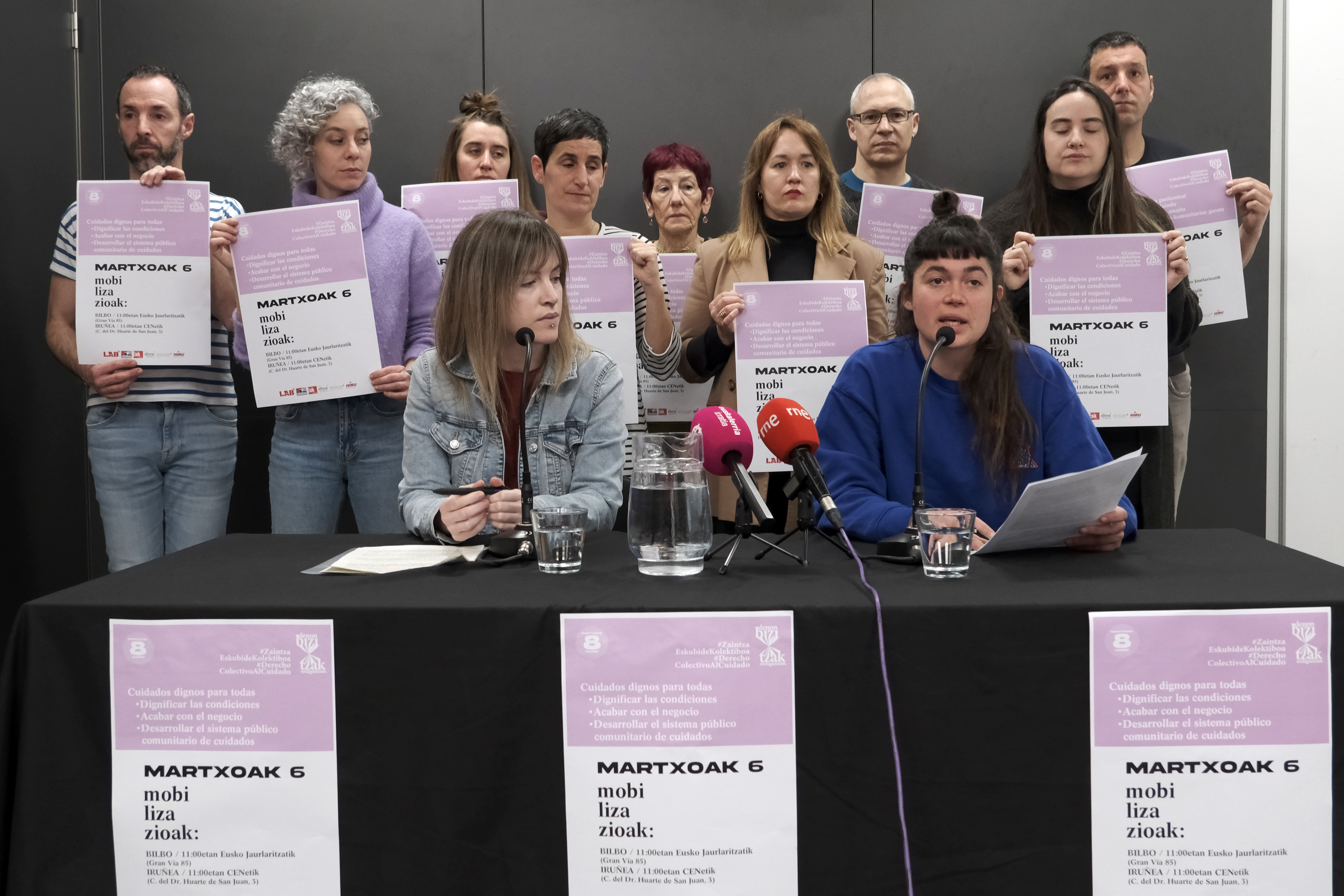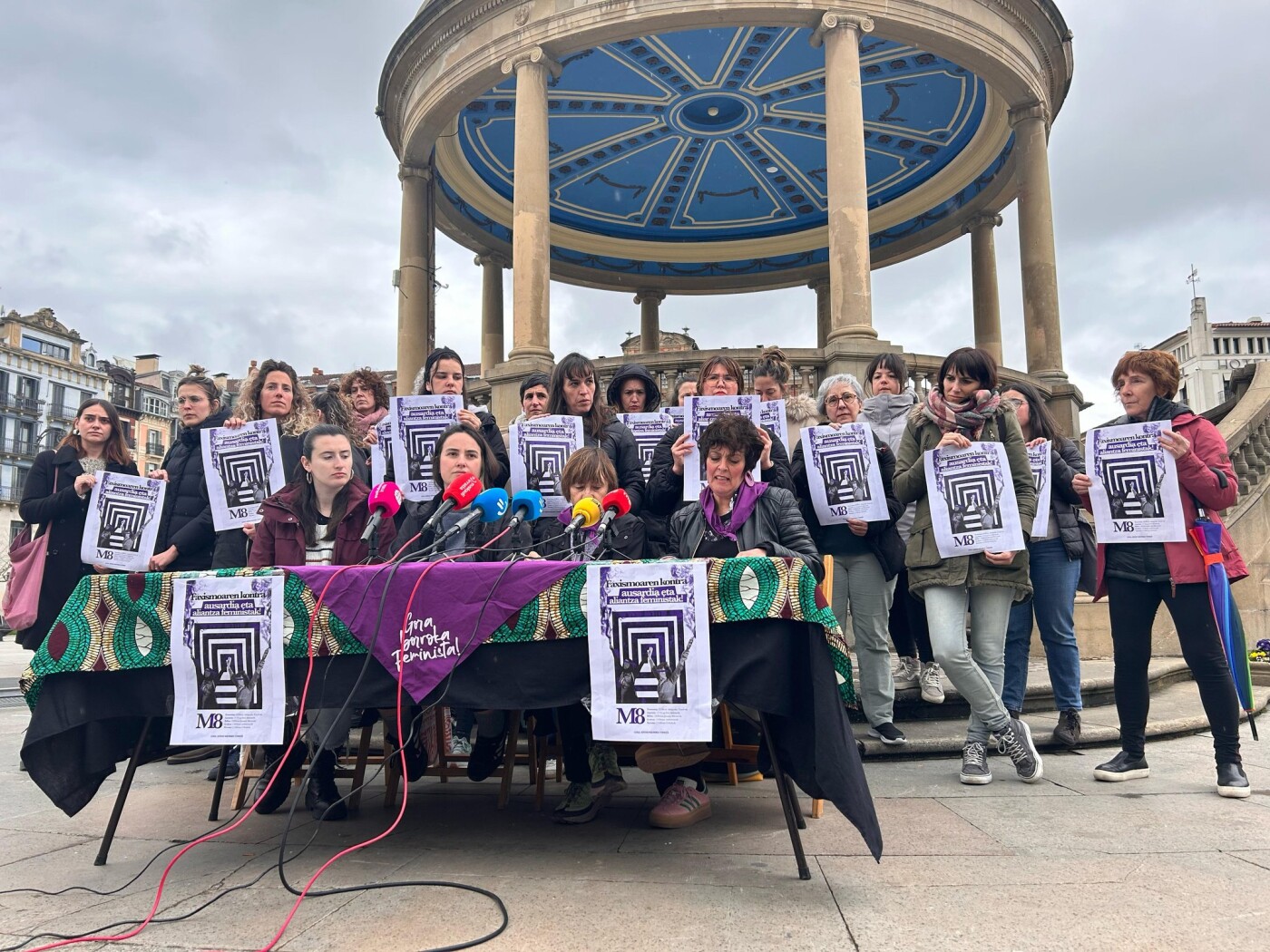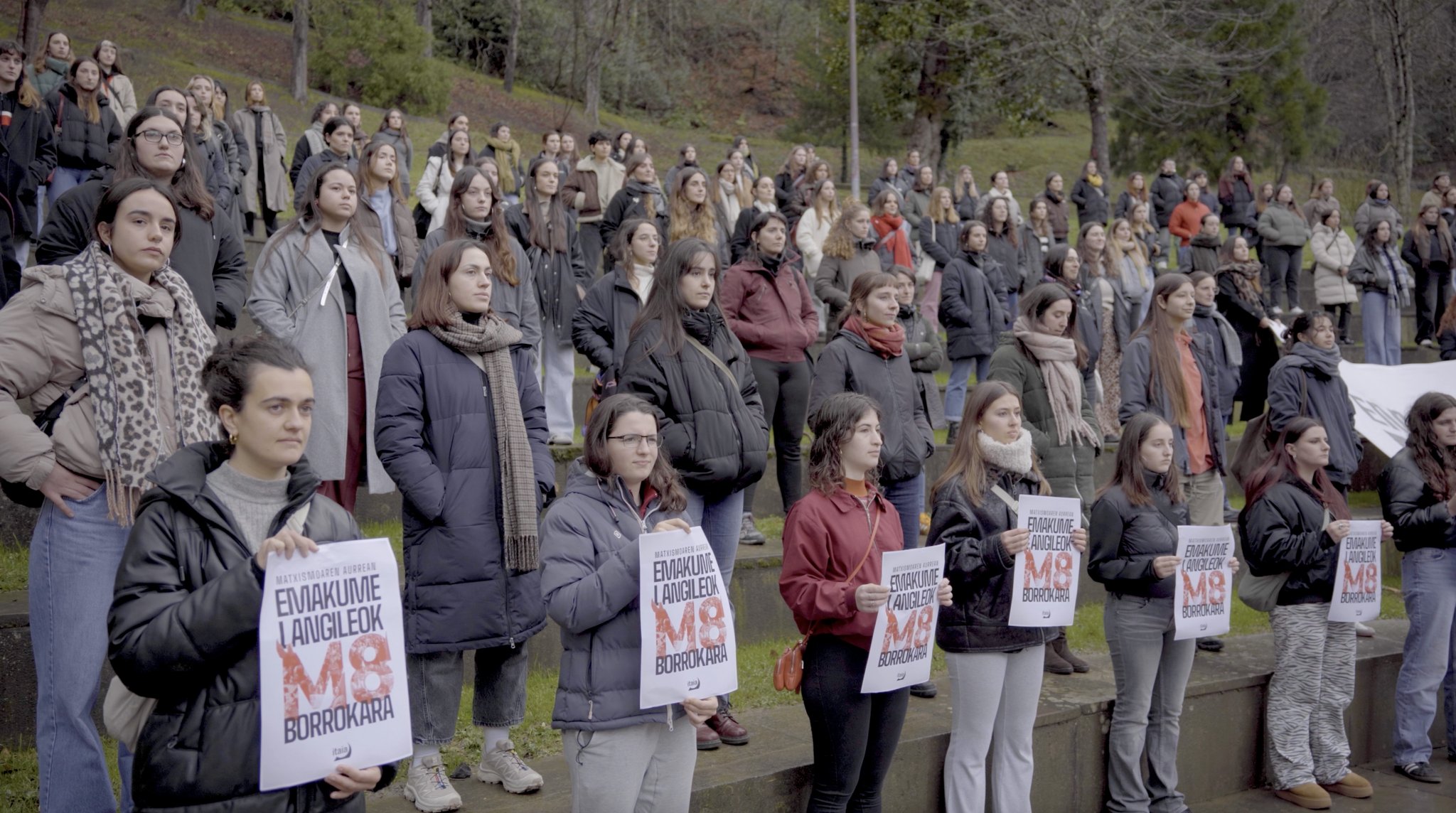If there is broth, if we are open to new flavors
- The Feminist Conference in Durango has gathered at least 3,000 women*, all linked to the same objective: to reflect, debate, get to know each other, to weave networks and define strategic lines for the future of the autonomous feminist movement. From 1 to 3 November, the motto “Salda Dago” has ceased to be a metaphor to become a reality. For his successful participation, a broth that has been overflowing from time to time has been disgraced; when he has been made to bring the ingredients from the shore in half, it has caused some boiling broth and some burn.
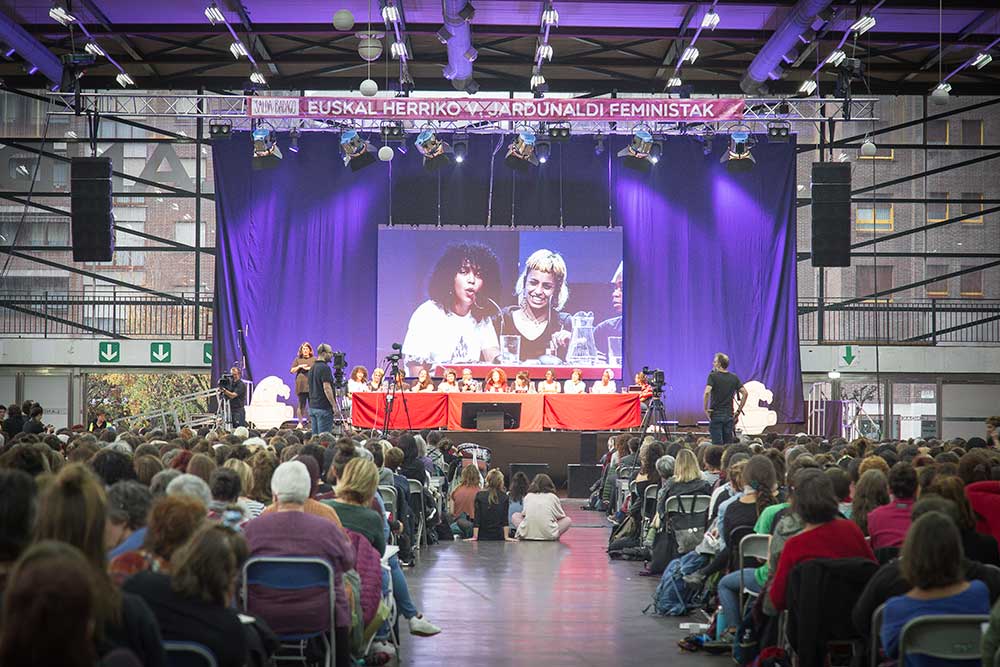
Eleven years after the fourth edition of the Feminist Conference held in Portugalete in 2008, the feminist movement of Euskal Herria has reconvened in a special event held every decade. However, the reason for joining is not as simple as the passing of a decade, but it has more reason to focus on the changes that have produced the passage of the years, and on the need to detect how we have transformed our realities and the feminist movement of Euskal Herria itself. From the need to “share analysis of the situation and, above all, to define joint strategies from now on”, the feminist movement details in the dossier of the days.
It is not a simple challenge, as the movement underlines, because the times we live have brought very different changes in different areas, from the ideological to the institutional, to the social, the economic and the political. Capitalism is reorganizing; neoliberal economic policies dominate the agendas of the rulers here and there; the commodification of life is becoming increasingly savage; the gap between classes is widening, marginalized individuals are becoming even more precarious; the criminalization of social struggle is intensifying; militarization is constantly forced to flee from their place of residence, hundreds of people are forced to flee the context of daily crises. Among others.
To all this we must add the new political context that Euskal Herria is living in, very different from the one that he lived eleven years ago. The feminist movement has made clear that: “In the solution of the armed conflict that has gone through our bodies and our movement for years” has much to “say, reflect and influence”. And the situation becomes even more complicated when one takes into account that the passing of the years has also transformed the feminist movement. Because the movement has inevitably changed as its “visibility, legitimacy and ability to mobilize” has increased and strengthened. However, if there is any movement that is able to combine personal with political, it is feminist. The movement is not free for years, according to the movement itself: “We are heirs to the feminist theories and practices of many years in Euskal Herria.”
Around five axes
Durango reflects on the strategies to be followed to turn the world order that life brings us upside down and put life at the center, and with the objective of carrying out the task in an organized way, they have been structured around five axes: A shared agenda and sovereignty to focus lives; Decolonality; Bodies and sexualities; Building lives free of violence; and Looking at the bowels of the Feminist Movement. Five axes, always bearing in mind that the topics discussed in them, the various forms of oppression of the patriarchate, must be understood as intertwined.
Within the framework of a broad and varied programme of meetings, five axis central round tables have been formed. The first was played on Friday morning. Following the host event of Beatriz Egizábal in multiple languages and with humor, Etxaldeko Emakumeak, Itaia, Bilgune Feminista, Oneka and Non-Domesticated Workers met around the round table The shared agenda and sovereignties to centralize lives.
Faced with a plural and enthusiastic audience that distinguished diversity, over the past two years they have devoted themselves to reflecting on how to carry out what the strike of 8 March had proclaimed: to chart the path that had to be taken to put lives at the centre. Josefina Roco Sanfilippo, of the group Non-Domesticated Workers, spoke about what the task meant, noting that “we came to change everything”. Feminist sovereignty was the border, they talked about the areas that need to be transformed in the construction of another social model, stressing the need to work together and setting objectives such as obtaining dignified pensions, abolishing the figure of the resident household employee, consolidating food sovereignty, reforming the class struggle and reducing the bourgeoisie’s control over workers.
.jpg)
Legitimization of feminist self-defense
The social organization that puts life at the center has to be free from violence, and that is why a round table was offered on Building lives free from violence to reflect on violence. Medeak, Bilgune Feminista, Emakume Internazionalistak, Justizia Feminista mintegia and F.A.R.U.K.A.S. The groups approached male violence from different points of view, with reflections on different vertices.
“It is important to understand all the roots of male violence well, as ending male violence requires the elimination of many forms of violence,” he answered a few days earlier asking what Josebe Iturrioz, a member of the Medeak group, would address at a roundtable in which he deepened the issue and in which the role of violence is to support the heteropatriarchal system, legitimizing self-defense. He insisted that “we should be aware of the performative techniques of violence, intelligence and mutual care,” and not apologize for violence. In his opinion, feminism cannot pretend to “have increasingly violent societies.”
F.A.R.U.K.A.S. based on feminist self-defense. The group showed its legitimacy to respond with violence to violence. Before taking the floor, the group reproduced a video in which feminist self-defense was clearly claimed, and the collective sentiment that it aroused in the public gave way to the culminating moment of a round table in which there was an outbreak of emotions and applause among the attendees. If the feminist self-defense option was manifested at the table, the audience’s reaction confirmed this option and underlined the potential of choice for empowerment.
The interlocutors also went beyond self-defense, to the point of talking about feminist justice. Regarding this last topic, the Feminist Justice seminar emphasized that it is not easy to build a model of justice that is not punishable, “because the discourse of vengeance and grief is deeply rooted”. However, they all stressed the need to give way to the construction of another model of justice.
.jpg)
Debates of the European Parliament
The task of creating a unitary agenda for such a plural movement is not easy to do. As established by the World March of Women of Euskal Herria in its round table on the bowels of the Feminist Movement, although capital presents diversity as something comfortable, the management of diversity itself is difficult. As in every agenda, in the feminist movement there are also household chores that seem thicker than others, and the fatter chores have to do with making room for diversity.
In order to weave networks, the organizers have sought to make the movement as a whole feel part of the days, with special attention to the groups of women who are not at the center of the movement. “Collect your contributions directly and bring your voices to the center and be present,” explained Garazi Goienetxea Díez, coordinator of the project. The voices of the Bazterreta collectives raised from the center have left little to anyone of the group that usually occupies the center. White women, originally autochthonous, heterosexual and cisgenus who are hegemony within feminism, have been questioned on several occasions from the margins, indicating the privileges granted by the position they occupy.
Mines, B.A.L.A., Some of these questions revolved around the Bodies and Sexualities round table formed by Oz, Sare Lesbianista and Elkartean. In no uncertain terms, the members of Sare Lesbianista threw a question that would have cut their breath to more than one: “Can you be a heterosexual feminist?” In this sense, they invited the attendees to reflect on why fraternity is not sexualized.
Not only did they want to question the heterosexuals, but also non-politicized lesbians. Some of the rapporteurs who presented themselves as wallets, indicating that the term refers to a political option, unlike lesbians. Members clearly explained B.A.L.A.ko that being a bullfighter is fighting heteronorma from dissidence. In this sense, the members of Sare Lesbianista added that they feel comfortable at the margins of the river, suggesting that their political choice is radical and do not want to occupy the center or be normative.
At the same table, discussions were held on the possibility of writing with an asterisk the designation of women that included various identities. For some it is a confusing formula and for others it is more exclusionary than inclusive. On the contrary, according to a contribution from the public, the izartxo indicates that the feminist movement is placing the category of women in conflict. Although no conclusions were drawn, the use of the asterisk was discussed.
.jpg)
Decolonality by opposite throat
The discussions around the round table were, however, the ones that most confused the listeners. In a table composed of members of the Garaipen, Women of the World, Ahizpatasuna, Rails, Amar and Euskal Herriko Sarea groups of Migrated and Racialized Women, the “whiteness” of the feminist movement was manifested, the hegemony that this white majority embodies in the movement and the privileges it grants them. Around the table, the member of the Network of Migrated and Racialized Women of the Basque Country began the conversation questioning the presence of a non-racialized woman, and during the two hours that the table lasted, they kept on the table the privileges of the hegemonic feminists.
“We will tell 3,000 white feminists how they can also be oppressors and racists (…) There have never been decolonial tables. We’re making history,” you could read in a note published by the Rails group on social media hours before you spoke. Fainting could be expected.
Beyond highlighting privileges in their crude, racist members revealed the alliances they wanted: they would not need instrumentalized alliances, but build bridges between them. They stressed that indigenous feminists refuse to be led or instrumented and will not allow them to be used as quotas.
The interpellations deeply agitated the non-rationalized members, the rod disturbances and the resistance to the observation of their own privileges provoked conflicts. After the round table, the debate arose with the intervention of the public, but the hardest occurred when the rapporteurs left the stage: according to the organization the following day, some attacked the racist members, causing the implementation of the protocol against the aggressions.
The facts showed the need to look at our navel and to identify and work on the privileges we have. As Bilgune Feminist pointed out on Sunday, we are very used to identifying ourselves with the role of the oppressed, “but how hard it is for us to be challenged.” On the road to the construction of a plural and inclusive movement, it became clear that one of the main issues to be addressed in the future is that of decoloniality, a task that will require a lot of self-criticism.
Days before the conference, the diners Afaf el Halaoui and Cony Carranza clearly stated that there is still much to be done in this matter. Carranza had conflicting feelings about the days: illusion, because the issue would be addressed, and concern, knowing that there would be a scandal. However, he said clearly: “It is necessary to create a scandal.” However, he emphasized the key that can calm down the nasty work of working privileges: that it is not a work of guilt, but of responsibility. It is known that when there is guilt, everything becomes uglier than it is by nature. The Halaoui stressed the need to accept differences in order to build a truly plural movement and claimed that there should be no Westernization on the road to freedom.
.jpg)
Prospective
At the last central table on the bowels of the feminist movement, as well as in small group assemblies, the movement did a work inside, identifying the challenges to follow after the shared debates and debates that have been given, and reflecting on the strategies to be adopted.
Amuge, PAF! The World Women's March of Euskal Herria, the Women's Assembly of Bizkaia (BEA), Bilgune Feminista, Lanbroa, Egin Dezagun Topa and Feministaldeko Kides brought together a series of tasks: to strengthen the internal structure of the movement, to work their own feminist agenda in the Basque Herria debate, to revise the spaces of feminist.
From the long list they have highlighted, in any case, a couple of issues. On the one hand, the members of the table have been concerned about the assimilation of capitalism in the face of the rise of feminism in recent years: Egin Dezagun Top has detected that capitalism sells a “make-up” feminism to young girls, and BEA has underlined the need to be attentive to “standardized feminism”, with the conviction that it drives feeling feminist with total comfort without revolutionary content.
On the eve of the conference, Josebe Iturrioz presented the same responsibility, stating that the rise of feminism is as dangerous as it is interesting: “On social media, people read and become feminist. And it's OK. But they don’t know the political forms of movement, how we militate.” The days have also been an attempt to bring all these women closer together, in order to activate feminists who are not in the movement, to break - or at least to reduce - the gap between organized and unorganized feminists. It is not known how many unorganized people were able to activate in the first three days of November, but it is undeniable that the activation has been given: the days have gathered a number of participants that did not repeat since the first meetings, enough for the number of women who wanted to reflect on feminism to collapse workshops and conferences.
The other theme that stood out, as you would expect, was diversity. The depths mixed by the interpellations received at the round table on decolonality, and the discomfort of the aggression suffered by racist members, were dragged to Sunday by the participants, which shows that every rapporteur has spoken on the subject. On the first day, when the conflict was still calm, there was a doubt that caused concern: Would the tension that had arisen in the decolony debate lead to a gap in movement or would the willingness to go along the road jointly prevail? The balance, for its part, opted for a unitary route on Sunday in Valencia. Yes: reaffirming ourselves in radical feminism anti-colonialist, anti-racist, anti-patriarchal and anti-capitalist; and explaining the need to work privileges.
“Although we are more and more plural, we are not as varied as we want. We have to analyze privileges and build spaces that, instead of inviting anyone, make them feel part,” Feministalde said. At the table was Tamara Clavería de Amuge, who also talked about the topic, once again questioning the hegemony: “The Gypsies are still invisible forever,” and it seemed that it is also in feminism. “Intersectionality remains a dream, a desire,” said EH’s World Women’s March. The latter, taking advantage of the fact that many went home full of questions, asked a question that will condition the way forward: “What will we do with those discomforts?” There is the key to achieving a feminist movement that is truly plural, although it requires looking inwards, questioning many things and recognizing that oneself can also be oppressive. It is not an easy to digest dish, which tells us what we are trying to digest from the first day of the days. However, as Kattalin Miner and Nagore Iturrioz commented on one of the round tables, in comfort there is no revolution. This statement should be sufficiently motivated to penetrate the discomforts to the ears. We have a new world that has life in the middle to win.
.jpg)
Closure punctured with tiredness and emotiveness
The afternoon of Sunday came with the backpacks filled with themes for reflection, the list of tasks filled with personal and collective works, and with fatigue. Leaving behind the topics of conversation, the next thing was to close the days, this time in celebration format. Aside from the fatigue and discomfort accumulated over three days, because there was much to celebrate: as Miren Aranguren, a member of the feminist movement, said, to begin “mistakes, conflicts, attempted revolution.” From there, no doubt, each of them had many other reasons for the celebration. Because even though feminism demands a lot, it's more what it gives.
The march left behind Landako, the main venue of the days, and filled the streets with feminist demands throughout Durango. The most emotional thing, though, was the return to Landako. At the closing event, we were excited by the people who listened to us from the stage. Two members from Catalonia and Guatemala were the first to speak, one from Rojava’s Women’s Self-Defense Unit (YPJ), and several from the feminist movement. With different words and messages, everyone gave us applause, some tear that they let us down, they screamed… and the next day they got back up and many reasons to keep fighting. An emotional lever and an impeccable force, now that the time has come to implement everything that has been established in the days.
.jpg)
Martxoaren 8a Getxo bere bizitokian igaro du: kumbia dekolonial eta antiarrazista topaketa antolatu du Algortako Herriko Tabernan, Abianen, Hija del Nopal DJrekin batera.
Argentinatik Getxora migratu zen Celeste Agüero, kantutegi herrikoi batekin eta poesia xuxurlatzeko... [+]
Mugimendu feministak manifestazioak egin ditu goizean Donostian, Gasteizen eta Iruñean eta arratsaldean Baionan eta Bilbon. Oinarrizko irakurketa partekatu dute, eta horri gehitu diote hiri bakoitzean bertako problematika, eragile eta ekimenen erreferentzia.
Bilgune Feministak Heldulekuak argi, Euskal Herria feminista leloa baliatu du M8an, azpimarratzeko feminismoak ematen dituela “datorrenari aurre egiteko tresnak”, eta gogorarazteko faxismoaren gorakadaren testuinguru hau helduleku horretatik irakurri eta borrokatu... [+]
MAITE: (biharko eguna antolatzen bere buruaren baitan) Jaiki, gosaldu, bazkaria prestatu, arropa garbitu, etxea garbitu, gizon hori jaiki, seme-alabak jaiki, hiru horien gosaria prestatu, haiek agurtu, erosketak egin, lanera joan, seme-alabak eskolatik jaso, merienda eman,... [+]
Festa egiteko musika eta kontzertu eskaintza ez ezik, erakusketak, hitzaldiak, zine eta antzerki ikuskizunak eta zientoka ekintza kultural antolatu dituzte eragile ugarik Martxoaren 8aren bueltarako. Artikulu honetan, bilduma moduan, zokorrak gisa miatuko ditugu Euskal Herriko... [+]
“Kasu, ez gitxu lo!”. Gure denbora eta manerekin baina heldu gira.
Azaroaren 25ean Baionako elgarretaratzera joan ez joan eta autoak nola partekatu pentsatzetik (joan-jina bi oren), bat-batean Lartzabalen elgarretaratze bat antolatu genuen, eta 47 emazte bildu!... [+]
Martxoaren 8a, Emakumeen Nazioarteko Eguna, munduan zehar milioika emakumeontzat berdintasuna, eskubideak eta justizia eskatzeko borroka eguna da. Hala ere, gerrek, gatazkek eta politika militaristen hazkundeak markatutako testuinguru global batean, inoiz baino premiazkoagoa da... [+]
Nahiz eta Nazio Batuen Erakundeak (NBE) 1977an nazioarteko egun bat bezala deklaratu zuen eta haren jatorriaren hipotesi ezberdinak diren, Martxoaren 8aren iturria berez emazte langileen mugimenduari lotua da.
Euskal Herriko Bilgune Feministak deituta elkarretaratzea egin dute Hernanin Iratxe Sorzabali elkartasuna adierazi eta "babes osoa" emateko. Inkomunikatuta egon zen uneak berriz ere epailearen aurrean kontatu behar izatea, "bizi izandakoak utzitako ondorioen... [+]
Lantzeko inauteri txikien kalejira ikusle guztien begietara urtero modukoa izan zen. Txatxoak, Zaldiko, Ziripot eta Miel Otxin herriko ostatuko ganbaratik jaitsi eta herritik barna bira egin zuten txistularien laguntzarekin. Askok, ordea, ez zekiten une historiko bat bizitzen... [+]
Martxoaren 6an 11:00etan Bilbon eta Iruñean mobilizazioak egingo dituzte sindikatuek, patronalak eta Eusko Jaurlaritza zein Nafarroako Gobernua interpelatzeko, zaintza eskubide kolektiboari dagokionez.
Martxoaren 8a hurbiltzen ari zaigu, eta urtero bezala, instituzioek haien diskurtsoak berdintasun politika eta feminismoz josten dituzte, eta enpresek borroka egun hau “emazteen egunera” murrizten dute, emakumeei bideratutako merkatu estereotipatu oso bati bidea... [+]
Martxoak 8a heltzear da beste urtebetez, eta nahiz eta zenbaitek erabiltzen duten urtean behin beren irudia morez margotzeko soilik, feministek kaleak aldarriz betetzeko baliatzen dute egun seinalatu hau. 2020an, duela bost urte, milaka emakumek elkarrekin oihukatu zuten euren... [+]
Gazteagotan baino lotsa handiagoa dauka, baina horrek ez dio saltsa askotan ibiltzeko gogoa kentzen Leire Zabalza Santestebani (Iruñea, 1990). Beste gauza askoren artean, Motxila 21 musika taldeko kidea da. Nabarmendu du musika gauza asko aldarrikatzeko bide izan... [+]
Martxoak 8aren izaera iraultzailea berreskuratzeko deia egin du Itaia emakumeen antolakunde sozialistak. Irene Ruiz Itaiako kideak azaldu digunez, “oldarraldi erreakzionarioaren eta matxismoaren aurrean proposamen iraultzailea hauspotu eta kontzientzia sozialista... [+]









